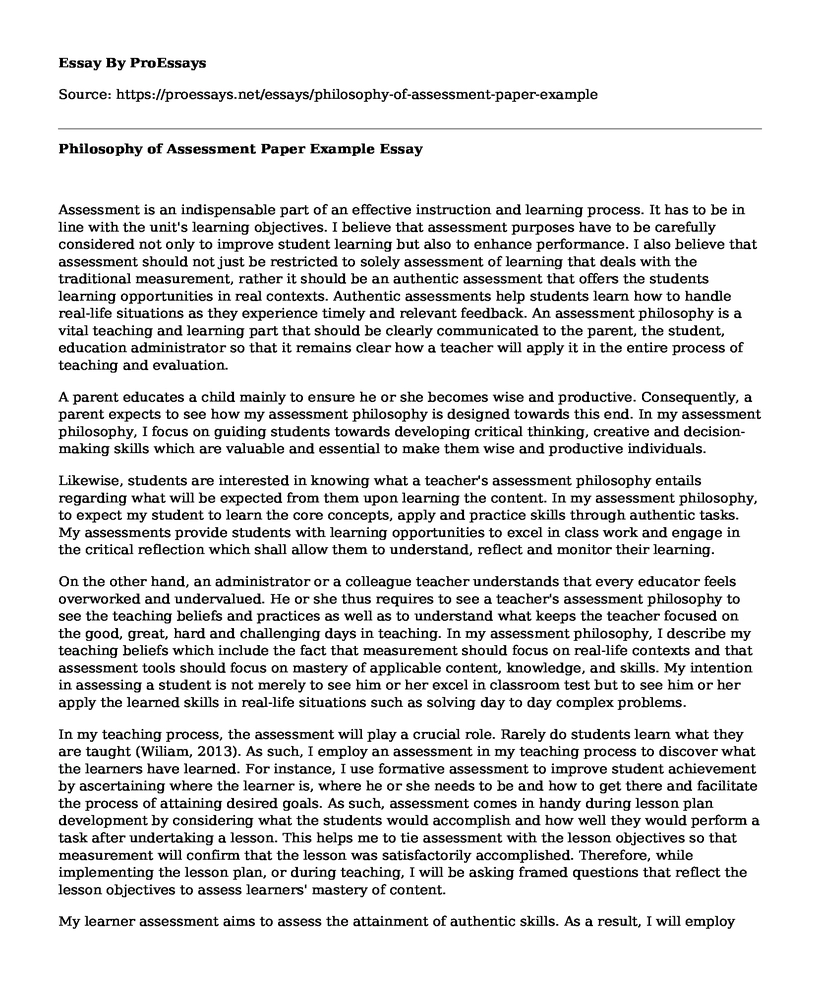Assessment is an indispensable part of an effective instruction and learning process. It has to be in line with the unit's learning objectives. I believe that assessment purposes have to be carefully considered not only to improve student learning but also to enhance performance. I also believe that assessment should not just be restricted to solely assessment of learning that deals with the traditional measurement, rather it should be an authentic assessment that offers the students learning opportunities in real contexts. Authentic assessments help students learn how to handle real-life situations as they experience timely and relevant feedback. An assessment philosophy is a vital teaching and learning part that should be clearly communicated to the parent, the student, education administrator so that it remains clear how a teacher will apply it in the entire process of teaching and evaluation.
A parent educates a child mainly to ensure he or she becomes wise and productive. Consequently, a parent expects to see how my assessment philosophy is designed towards this end. In my assessment philosophy, I focus on guiding students towards developing critical thinking, creative and decision-making skills which are valuable and essential to make them wise and productive individuals.
Likewise, students are interested in knowing what a teacher's assessment philosophy entails regarding what will be expected from them upon learning the content. In my assessment philosophy, to expect my student to learn the core concepts, apply and practice skills through authentic tasks. My assessments provide students with learning opportunities to excel in class work and engage in the critical reflection which shall allow them to understand, reflect and monitor their learning.
On the other hand, an administrator or a colleague teacher understands that every educator feels overworked and undervalued. He or she thus requires to see a teacher's assessment philosophy to see the teaching beliefs and practices as well as to understand what keeps the teacher focused on the good, great, hard and challenging days in teaching. In my assessment philosophy, I describe my teaching beliefs which include the fact that measurement should focus on real-life contexts and that assessment tools should focus on mastery of applicable content, knowledge, and skills. My intention in assessing a student is not merely to see him or her excel in classroom test but to see him or her apply the learned skills in real-life situations such as solving day to day complex problems.
In my teaching process, the assessment will play a crucial role. Rarely do students learn what they are taught (Wiliam, 2013). As such, I employ an assessment in my teaching process to discover what the learners have learned. For instance, I use formative assessment to improve student achievement by ascertaining where the learner is, where he or she needs to be and how to get there and facilitate the process of attaining desired goals. As such, assessment comes in handy during lesson plan development by considering what the students would accomplish and how well they would perform a task after undertaking a lesson. This helps me to tie assessment with the lesson objectives so that measurement will confirm that the lesson was satisfactorily accomplished. Therefore, while implementing the lesson plan, or during teaching, I will be asking framed questions that reflect the lesson objectives to assess learners' mastery of content.
My learner assessment aims to assess the attainment of authentic skills. As a result, I will employ various assessment techniques such as reports, speeches, journals, and interviews to measure their understanding of the subject matter. My aim in evaluation is to enhance the learning process as well as assist learners to gain knowledge and skills beneficial in real-world experiences.
Finally, the crucial part of teaching is to reflect on the teaching practices and underlying beliefs to make necessary changes and improvements. I would reflect on my teaching by recording lessons, collecting student feedback and peer observation. Recorded lessons will help me figure out how well I delivered the content and see areas of weaknesses that need improvement. Similarly, student feedback will highlight areas that I may have been weak in and provide for future improvement. Peer observation will be critical in pointing out strengths and weaknesses as well as sharing good teaching practices that I need to inculcate.
Conclusion
Therefore, in my assessment philosophy, I consider helping the learner to apply knowledge and skills in a real-world context. This means that as I teach, I ensure that I assess whether the learner achieves the lesson objectives which reflect the knowledge and skills that are applicable in the real world.
References
Wiliam, D. (2013). Assessment: The bridge between teaching and learning. Voices from the Middle, 21(2), 15.
Cite this page
Philosophy of Assessment Paper Example. (2022, Sep 07). Retrieved from https://proessays.net/essays/philosophy-of-assessment-paper-example
If you are the original author of this essay and no longer wish to have it published on the ProEssays website, please click below to request its removal:
- Application for Scholarship
- Personal Reflection on English 101 Course
- Principles of Professional Ethics for the Intelligence Community to Nursing Code of Ethics
- Do Good Questions Have to Be True? Essay Example
- School Principal: Leader, Link & Policy Enforcer - Essay Sample
- Diabetic Patient - Report Example
- Business Strategy Plan Essay







